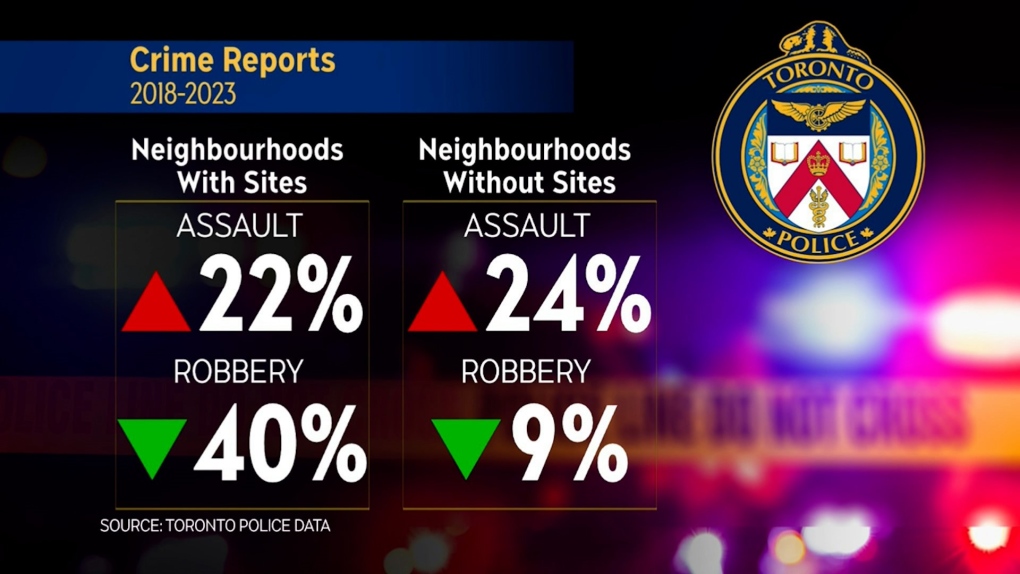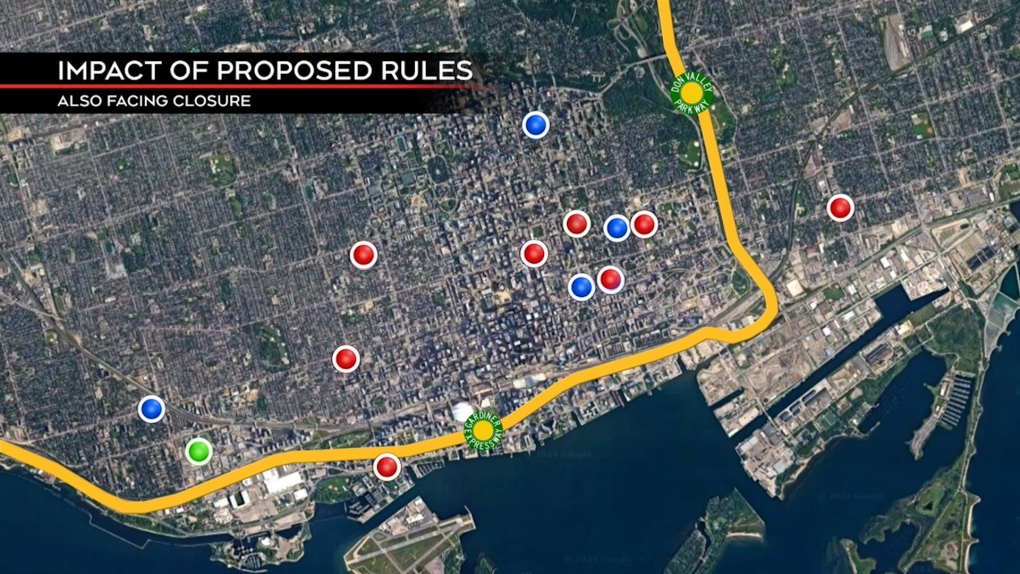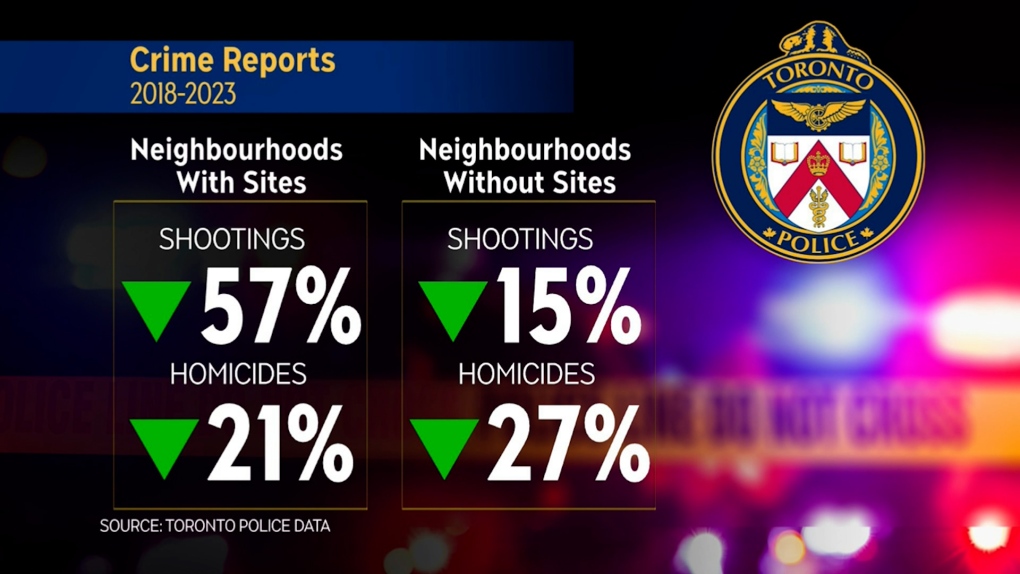Toronto neighbourhoods with drug consumption sites saw many types of crime drop: data
One of the Doug Ford government’s rationales for a sweeping policy that would shutter supervised drug consumption sites was that they are linked to crime – but a review of publicly posted Toronto police data shows they may have the opposite effect.
Crime types including robberies, bike thefts, break and enters, thefts from motor vehicles, shootings and homicides dropped among neighbourhoods with supervised drug consumption sites between 2018 and 2023, often more than they did in the rest of the city, the data shows.
One exception was the crime of assault, which rose by 22 per cent among neighbourhoods with sites, though neighbourhoods without sites saw a rise of 24 per cent, according to the review of the numbers by CTV News.
The trend may fly in the face of some preconceptions, said Bill Sinclair of The Neighbourhood Group, which operates a supervised consumption site in Kensington Market that is among those slated to close.
But Sinclair said the trend makes sense when you consider that these sites are helping troubled people and referring them to treatment or employment programs, and that may give them other options than turning to crime.
“I believe that good community services and a neighbourhood that cares about people does reduce crime. People who care for each other reduce crime,” Sinclair said in an interview.
 A CTV News analysis of Toronto crime data shows there were no pronounced increase in many forms of violent crime in neighbourhoods with supervised consumption sites.
A CTV News analysis of Toronto crime data shows there were no pronounced increase in many forms of violent crime in neighbourhoods with supervised consumption sites.
The Neighbourhood Group also runs a daycare across an alley from the supervised consumption site. That's the daycare it's too close to, Sinclair said, even though the two facilities have coexisted without incident for around six years.
Instead of consumption sites, the Ontario government would fund treatment centres, and not allow existing sites to move to conform to the boundaries.
The move would affect eight of the 14 sites in Toronto.
The impacted sites include five consumption and treatment sites (CTS) which do not conform with the new criteria, two city-run sites, and a sixth CTS in Moss Park, which is losing its current location to development and would be unable to find a new home.
 This map shows the Toronto supervised consumption sites slated for closure following the introduction of new rules on where the facilities can be located.
This map shows the Toronto supervised consumption sites slated for closure following the introduction of new rules on where the facilities can be located.
In rolling out the proposed policy, the Ontario government has referenced crime as one rationale, pointing to the stray bullet that killed Karolina Huebner-Makurat outside the South Riverdale Supervised Consumption Site last year.
“In Toronto, reports of assault in 2023 are 113 per cent higher and robbery is 97 per cent higher in neighbourhoods near these sites compared to the rest of the city,” the province wrote in a news release announcing the changes.
A spokesperson did not share their methodology when asked by CTV News.
The figures sound concerning, but may be simply because the sites were targeted to neighbourhoods with disorder in the first place, said Dr. Dan Werb, who researches a variety of aspects of supervised injection sites.
“There is some confusion of cause and effect here,” Werb said.
Werb was part of a team that analyzed homicide rates in Toronto before and after sites were established, from 2010 to 2023, and presented findings at the peer-reviewed International AIDS conference in July.
Their research found a “minimal but significant” reduction in fatal shootings and stabbings within 500 meters of a supervised consumption site, no change between 500 meters and three kilometers, and a “minimal but significant” increase in homicides farther out.
“These sites in and of themselves do not promote disorder,” Werb said. “When you provide people with services they need, it can help reduce crime.”
Werb’s efforts build on other research, including a New York study that found “no significant increase in crimes recorded by the police or calls for emergency service” in neighbourhoods where overdose prevention sites were located.
“To date, peer-reviewed research has found no evidence linking supervised consumption sites to increased crime,” another researcher said.
In the Toronto police data, in the neighbourhoods with sites, assaults rose 22 per cent, while neighbourhoods without sites saw an increase of 24 per cent.
Here is a look at some of the other data points:
- Robbery in the neighbourhoods with sites dropped 40 per cent, while robbery dropped 9 per cent in neighbourhoods without sites
- Bike thefts dropped 16 per cent in neighbourhoods with sites, while bike thefts dropped 26 per cent in areas without sites
- Break and enters dropped 13 per cent in neighbourhoods with sites, while break and enters in neighbourhoods without sites increased two per cent
- Thefts from motor vehicles dropped 50 per cent in neighbourhoods with sites, while in neighbourhoods without sites, those thefts rose three per cent
- Shootings dropped 57 per cent in neighbourhoods with sites, while shootings dropped 15 per cent in neighbourhoods without sites
- Homicides dropped 21 per cent in neighbourhoods with sites, while homicides dropped 27 per cent in neighbourhoods without sites
 A CTV News analysis of Toronto crime data shows there were no pronounced increase in many forms of violent crime in neighbourhoods with supervised consumption sites.
A CTV News analysis of Toronto crime data shows there were no pronounced increase in many forms of violent crime in neighbourhoods with supervised consumption sites.
In a news conference Monday, Ontario Premier Doug Ford said that he was drawing on his personal experience with his family, including former Toronto Mayor Rob Ford, to understand supervised consumption sites.
“Other people have their opinions, but I’ve seen what works and what doesn’t work. In my opinion, it’s a failed policy,” he told reporters.
Without harm reduction, workers worry that more people who are addicted to street drugs will overdose and die. A CTV News review of federal government data found that just the CTS sites slated to close revive three people a day in Toronto and six people a day across the province.
"It's pretty predictable what we are going to see when they close. An increase in the number of people dying," said Werb.
CTVNews.ca Top Stories

'She will not be missed': Trump on Freeland's departure from cabinet
As Canadians watched a day of considerable political turmoil for Prime Minister Justin Trudeau and his government given the sudden departure of Chrystia Freeland on Monday, it appears that U.S. president-elect Donald Trump was also watching it unfold.
Canadian government to make border security announcement today: sources
The federal government will make an announcement on new border security measures after question today, CTV News has learned.
Two employees charged in death of assisted care resident who ended up locked outside building overnight
Two employees at an Oshawa assisted living facility are facing charges in connection with the death of a resident who wandered outside the building during the winter and ended up locked outside all night.
The Canada Post strike is over, but it will take time to get back to normal, says spokesperson
Canada Post workers are back on the job after a gruelling four-week strike that halted deliveries across the country, but it could take time before operations are back to normal.
Lion Electric to file for creditor protection
Lion Electric, a Quebec-based manufacturer of electric buses and trucks, says that it plans to file for creditor protection.
Canada's inflation rate down a tick to 1.9% in November
Inflation edged down slightly to 1.9 per cent in November as price growth continued to stabilize in Canada.
Transit riders work together to rescue scared cat from underneath TTC streetcar
A group of TTC riders banded together to rescue a woman's cat from underneath a streetcar in downtown Toronto, saving one of its nine lives.
Trudeau considering his options as leader after Freeland quits cabinet, sources say
Chrystia Freeland, Canada's finance minister, said in an explosive letter published Monday morning that she will quit cabinet. Here's what happened on Monday, Dec. 16.
Teacher and a teenage student killed in a shooting at a Christian school in Wisconsin
A 15-year-old student killed a teacher and another teenager with a handgun Monday at a Christian school in Wisconsin, terrifying classmates including a second grader who made the 911 call that sent dozens of police officers rushing to the small school just a week before its Christmas break.

































